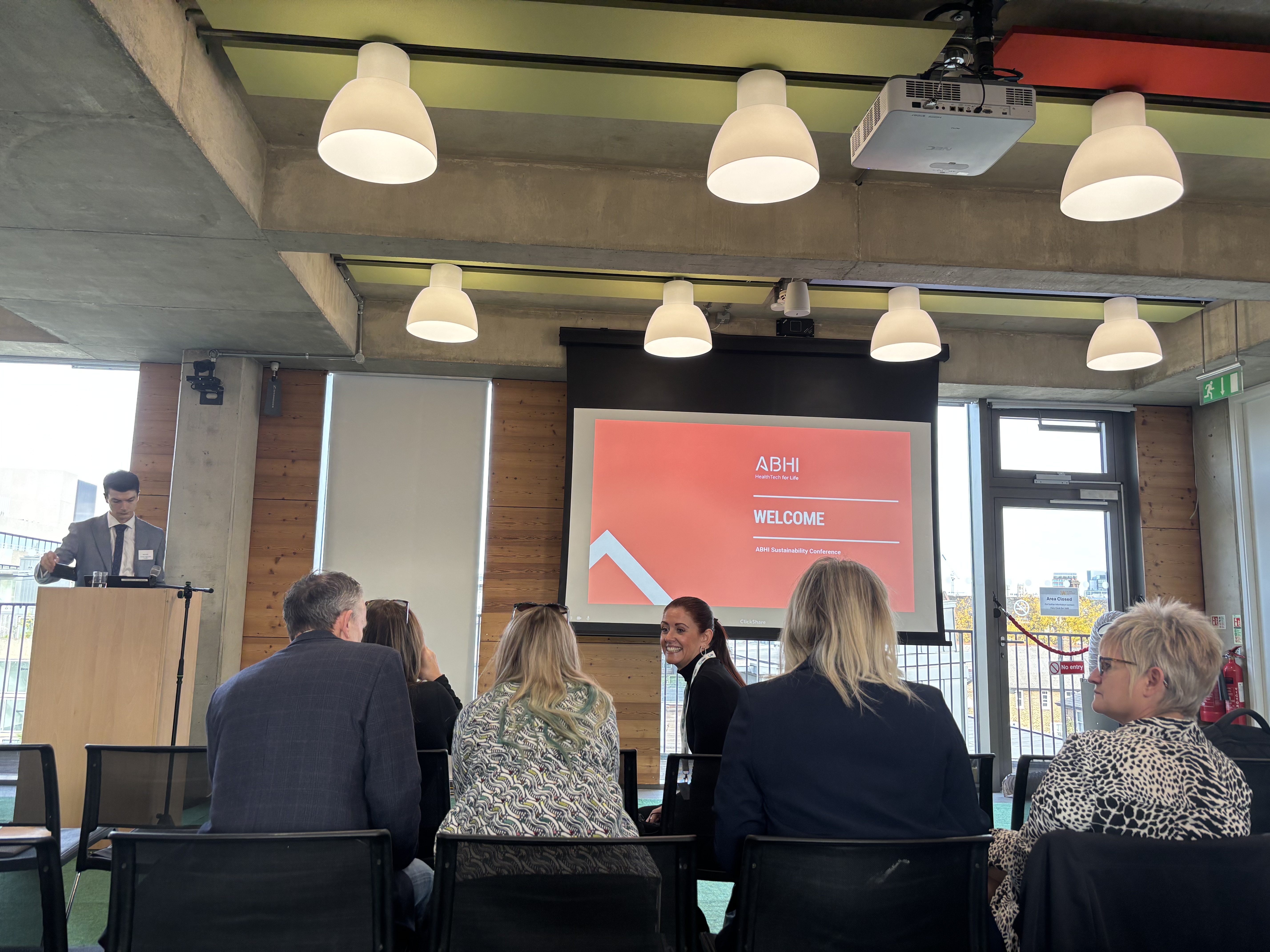As a Grant Funding Specialist at Life Sciences Hub Wales, and with previous experience working for a leading organisation focussed on sustainability, I'm passionate about the circular economy in healthcare, where the potential is huge.

At the recent ABHI Sustainability Conference, I saw how the healthcare and life sciences sector is not just ready for change but actively shaping it.
The conference brought together thought leaders, clinicians, policymakers, and industry experts to explore how we can embed sustainability into every layer of healthcare. From procurement to clinical pathways, from surgical theatres to supply chains, the message from the speakers was clear: we must act now to build a greener, more resilient healthcare system.
Rethinking procurement and product use
Joseph Burton from University College London Hospitals (UCLH) set the tone by challenging us to rethink what the NHS buys and how it uses those products. He highlighted the urgency of moving away from policies that still promote single-use items, a legacy of convenience that now poses a significant environmental burden.
Burton emphasised that while the desire for change is strong among NHS staff, systemic barriers remain. Procurement practices must evolve to support circular economy principles, and logistics systems need to be robust enough to handle reusable and sustainable alternatives. Encouragingly, the appetite for change is there, particularly when it comes to reducing waste.
Greener pathways and prevention
Simon Lambracos introduced the Greener GIRFT (Getting It Right First Time) pathways, showcasing how targeted evaluations and carbon hot-spotting can lead to meaningful reductions in emissions. His example of the bladder cancer pathway demonstrated that sustainability and patient care are not mutually exclusive but can enhance one another.
Lambracos also reminded us that prevention is one of the most powerful tools in reducing healthcare’s carbon footprint. By promoting healthier lifestyles, we reduce the need for medical intervention, which in turn lowers emissions. A simple yet profound shift in thinking that everyone can contribute to.
Lifecycle thinking and market transformation
Keith Moore from the Sustainable Healthcare Coalition spoke about the importance of Lifecycle Assessments (LCA) in driving sustainable innovation. He highlighted the global momentum behind sustainability, noting that industry is no longer operating in a single market, making sustainable products more appealing and viable which is critical when dealing with such a global pandemic. Further, his insights into decarbonising clinical trials underscored again the need for whole-supply-chain collaboration.
Moore also highlighted the Sustainable Markets Initiative, founded by King Charles III, which supports private sector organisations in their sustainability transitions.
Procurement as a catalyst for change
Alexandra Hammond from NHS England’s Sustainable Procurement Team shared updates from the newly published Greener NHS review and focused on target setting and reporting on Scope 3 emissions. She introduced the Evergreen Sustainable Supplier Assessment, a tool that allows suppliers to engage with the NHS on sustainability. With two-thirds of MedTech suppliers already participating ahead of the upcoming regulations, it’s clear that the momentum is building.
Heidi Barnard from NHS Supply Chain echoed this sentiment, advocating for a shift in procurement: buy less, buy better, buy different. She stressed the need to reward suppliers who prioritise sustainability and highlighted the ISEP Guidance for Reporting Requirements, which helps suppliers navigate the increasingly complex requirements.
Devolved nations: united in purpose
While much of the conference focused on NHS England, the devolved nations are equally committed to sustainability which is important to us at Life Sciences Hub Wales.
- Aled Guy from NHS Wales Shared Services Partnership spoke about the Well-being of Future Generations (Wales) Act, which underpins Wales’ sustainability strategy and the upcoming second draft of the NHS Wales Decarbonisation Strategic Delivery Plan which builds upon the 46 initiatives aimed at reducing emissions from the original first draft.
- Abigail Heijgelaar and Saskia Quelleron from NHS National Services Scotland emphasised the importance of social responsibility; not just from the NHS, but from its suppliers too.
Design for life and circular metrics
Michael Hopkinson from the Department of Health and Social Care (DHSC) shared progress on the Design for Life Roadmap. The document includes around 30 actions and one year on, half of them are already underway. He stressed the importance of developing circular KPIs and metrics to accurately record our improvements, and to ensure sustainability is a driving force to measure success.
Ground-level insights and EU perspectives
Sigrid Linher from MedTech Europe joined virtually to discuss the EU Green Deal and the Omnibus I document from a European Commission perspective, and a new report from the MedTech Europe on how industry can contribute to decarbonising healthcare whilst remaining competitive.
A strategic approach and political will
Martin Baxter from ISEP closed the event by reflecting on the Seventh Carbon Budget, published earlier this year. He noted that the healthcare sector has taken a strategic approach to sustainability but warned that political attitudes toward climate change are becoming fragmented. As champions of sustainability, he iterated that we must help people understand the science and possibly re-enact the knowledge that is already available to ensure co-operation.
The conference was an important reminder that sustainability in healthcare is not a niche concern but a necessity. From procurement to prevention, from policy to practice, every part of the system has a role to play.
By embracing sustainability, we can create a healthcare system that delivers high-quality care while minimising its environmental impact, ensuring long-term resilience for both people and planet.
If you have an innovative sustainable product or project and are looking for funding, please reach out to our Funding Team, fundingsupport@lshubwales.com.

